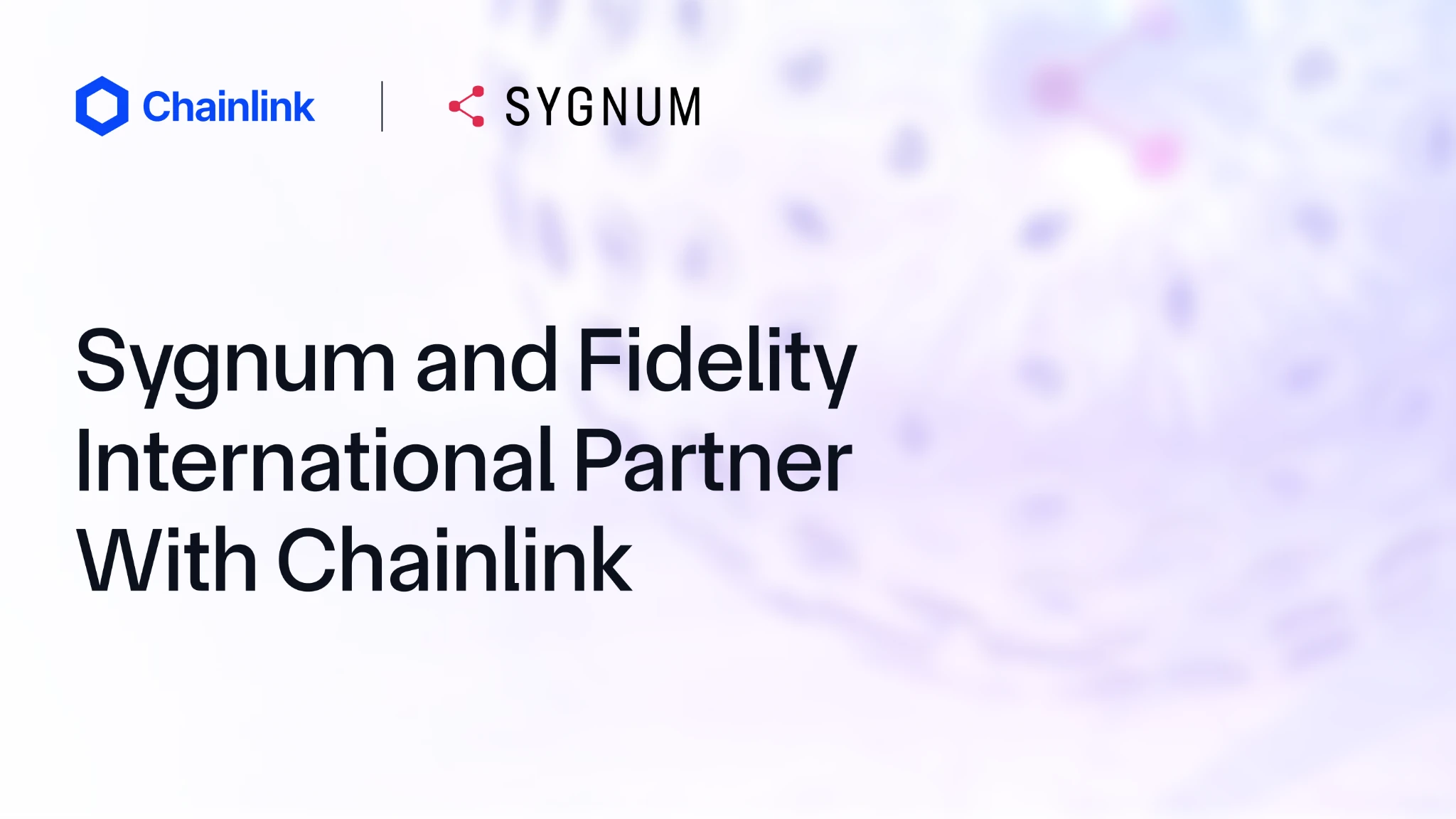
Zurich, July 3, 2024 – Chainlink today announced at the Point Zero Forum that it has partnered with Fidelity International and Sygnum to bring Net Asset Value (NAV) data on-chain. In a landmark use case for tokenized assets, the partnership will provide data transparency and accessibility to key asset data in Sygnum’s recently issued on-chain version of the $6.9 billion Fidelity International Institutional Liquidity Fund. Sygnum, a global digital asset banking group, previously tokenized $50 million of Matter Labs’ reserve assets, which are currently held in Fidelity International’s money market fund and issued on the ZKsync blockchain, a member of the Chainlink SCALE initiative.
Net Asset Value data is a key pillar of today’s traditional fund industry. With Chainlink, NAV data can be automatically, securely, and accurately transmitted and synchronized on-chain, providing Sygnum, Sygnum’s clients, and other market participants with real-time transparency and built-in access to historical data. In addition to this use case, Chainlink also adopts a blockchain-agnostic approach to NAV data distribution, so data can be securely transmitted between any blockchain or off-chain system. In order to meet the three conditions of tokenized assets , the Chainlink network not only transmits data on-chain, but also provides cross-chain interoperability and dynamic synchronization capabilities, allowing programmable assets to remain updated between any environments.
Fatmire Bekiri, Head of Tokenization at Sygnum, said: “As we continue to bridge the gap between traditional finance and the blockchain industry, developing standards is critical to promoting ecosystem participation and strengthening cooperation between blockchain companies, regulated financial institutions, and asset managers. This is an important milestone and I am very happy to see the hard work of Fidelity International, Chainlink, and Matter Labs finally come to fruition. We will continue to build the on-chain ecosystem in a regulated and compliant manner.”
Currently, more and more blockchain-native companies want to obtain asset and net worth data provided by fund management companies such as Fidelity International on-chain. Chainlink can accurately and securely upload and update net worth data to the chain, and this data can be transferred between any public and private chains through Chainlink.
“Tokenized funds are probably the most important trend in digital assets right now, and the fact that many global asset managers are jumping into this emerging space speaks volumes about the value of this trend,” said Sergey Nazarov, co-founder of Chainlink. “Tokenized funds offer significant advantages over traditional models, as they break through geographic restrictions and greatly improve efficiency. Over time, tokenized funds will become the mainstream model for the entire asset management industry.”
About Sygnum
Sygnum is a global digital asset banking group founded by a team in Switzerland and Singapore. Sygnum is fully mandated to invest in digital assets by professional and institutional investors, banks, corporates and distributed ledger technology foundations. Our team has institutional-grade security and professional personalized service, and its services include regulated digital asset banking, asset management, tokenization and B2B services.
Sygnum holds a banking license in Switzerland and CMS and Major Payment Institution Licenses in Singapore. The Group is also regulated in the global financial centers of Abu Dhabi and Luxembourg.
We believe that the future comes from inheritance. Our crypto-native team are professionals from the fields of banking, investment, and digital asset technology. They are committed to building a credible bridge between the traditional economy and the digital asset economy, which we call Future Finance. Please visit Sygnums official website to learn more about how Sygnums mission and values will shape the digital asset ecosystem.
About Chainlink
Chainlink is the industry-standard infrastructure for the tokenized asset economy, which has enabled over $12 trillion in transactions and transmitted over 12 billion on-chain data points for the blockchain ecosystem. Major financial market infrastructures and banks such as Swift, the Depository Trust Company (DTCC) and ANZ have partnered with Chainlink to demonstrate how financial institutions can use existing infrastructure and messaging standards to interact with tokenized assets on any blockchain.
About Fidelity International
Fidelity International provides investment solutions and services, as well as technical expertise in retirement planning, to more than 2.9 million clients worldwide. As a purpose-driven, privately held company with a 50-year heritage, we focus on the intergenerational transfer of wealth and long-term investing. Fidelity International covers more than 25 geographic markets with total assets under management of $816.9 billion. Our clients include central banks, sovereign wealth funds, large corporations, financial institutions, insurance companies, wealth management companies and individual investors.
Fidelity Internationals Global Platform Solutions business provides world-class investment options, third-party solutions, administrative services and pension guidance to individuals, financial advisors and employers. Together with its Investment Solutions Services business, Fidelity International has invested $583.8 billion on behalf of its clients. Combining its asset management expertise with its solutions for workplace and personal investing, Fidelity International is committed to building a better financial future together. For more information, visit fidelityinternational.com.
This article is for informational purposes only and contains statements about the future. Although the content of this article is based on rational assumptions, there is no guarantee that the final results will be consistent with the ideas in this article. There are risks in interacting with blockchain networks, including risks caused by user input errors. All content in this article is valid only on the date of initial publication. Due to the unpredictability of actual user feedback and future events, the content of this article may deviate from the subsequent actual situation, and we may not make corresponding changes in this article.










